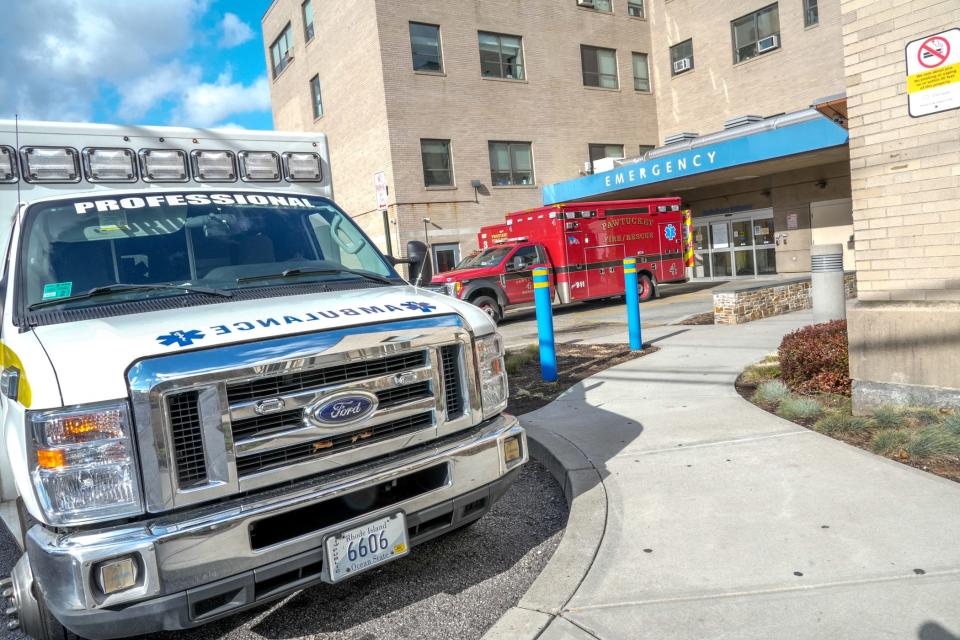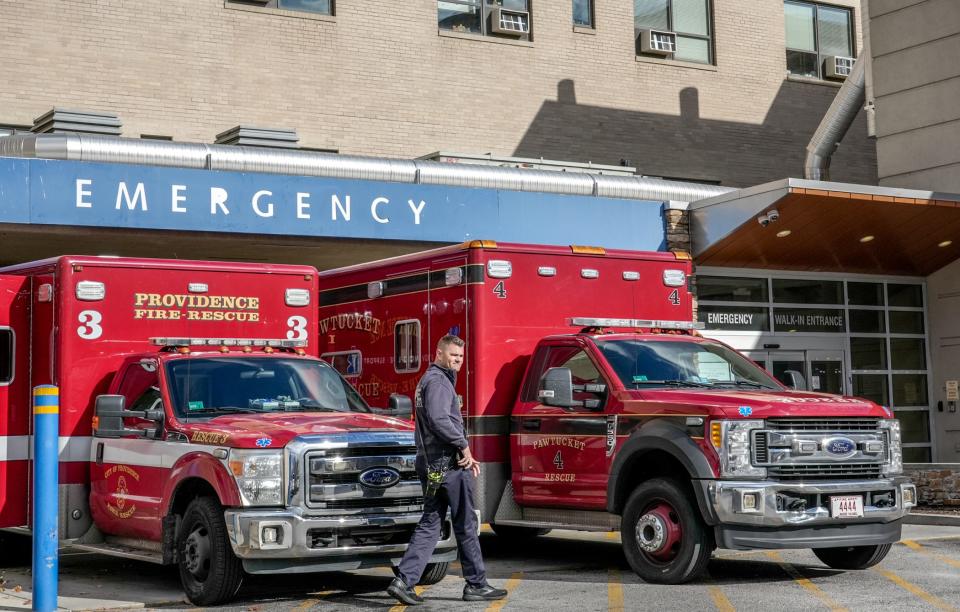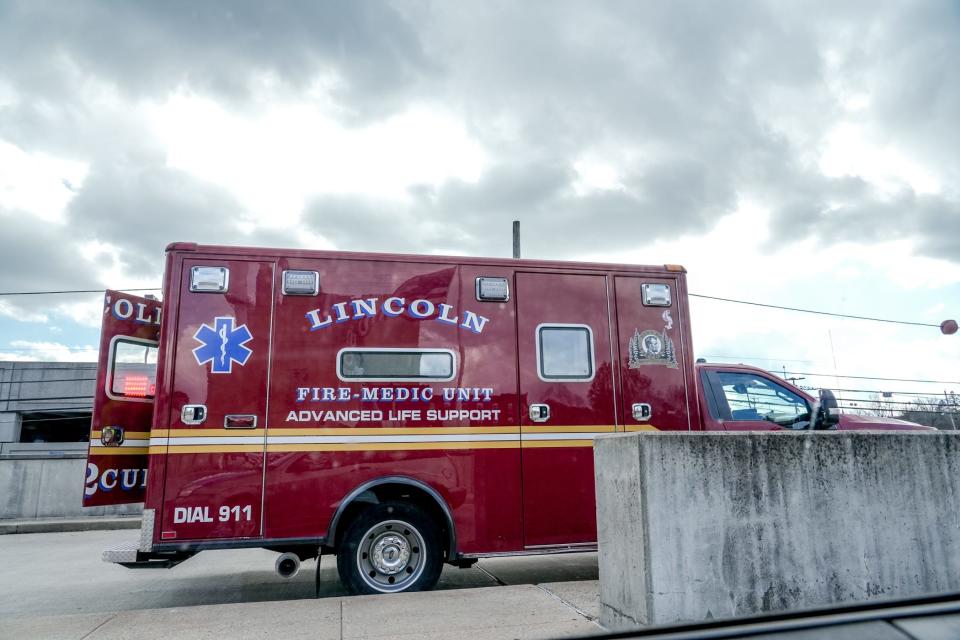RI Health officials are asking people to avoid ERs if possible. Here's where to go instead.
PROVIDENCE – From the head of emergency medicine at Kent Hospital came this picture on Thursday "of what an overcrowded emergency department looks like."
"Today it looks like an 82-year-old grandfather forced to wait in an emergency department for two days while having a heart attack because there is not a bed in the cardiology wing.
"It looks like a 24-year-old woman having a miscarriage, sitting in a hallway. ... while staff desperately try to find a sick patient who can come out of her room so she and her husband can have a private place to grieve. [And] it looks like a patient with depression that is so severe he is actively suicidal, forced to wait in the emergency department for three days for a psychiatric bed."
And a child vomiting in the waiting area, next to other sick patients.
"And the ugly reality is, none of this is new," even though a lot of emergency departments are actually "seeing fewer patients than we did before the pandemic began, Dr. Laura Forman told a news conference on Smith Hill.

"It's just that there are more and more roadblocks for our patients, more obstacles to getting them admitted, to getting them transferred, to getting them discharged to a nursing home, whether it's trying to find a private ambulance that can transport a bedbound patient ... or a rehab program that can take someone who wants to get sober or an ICU bed in a hospital that is plagued by supply-chain issues and staffing issues."
"These issues have long existed in health care, but the obstacles have grown," she said. "It's not that most emergency departments have more patients coming in. It's that emergency patients are in emergency departments for so much longer than they used to be."
Rhode Island health officials urge people to avoid hospital ERs

Dr. Forman was one of the state officials and medical professionals delivering a mix of good news and bad news at a news conference aimed at urging Rhode Islanders to seek alternatives to emergency rooms when possible.
The good news: the surge in cases of Respiratory Syncytial Virus that led to severe overcrowding at Hasbro Children's Hospital has abated, providing "a little bit of a breather in the past few days in that the RSV may have started to tick down a little bit," according to Dr. Linda Brown, Hasbro's director of pediatric emergency medicine.
"But I don't think any of us are claiming victory at this point," she said. "We really need to think about how we can try to minimize the patients in our emergency department that may not need to be there," she said.
The bad news?
Peak flu season is around the corner, and emergency room wait times run, on the worst days, "eight, nine, even ten hours" for drop-ins. The wait times are the result of a persistent health care worker shortage and the inability to move admitted patients out of the emergency room into beds occupied, in many cases, by patients the hospital is unable to move into more appropriate settings, because of obstacles all the way down the line.
Faced with this situation and the persistent presence of COVID-19 in the diagnosis of nearly 100 seriously ill and hospitalized patients, state health officials on Thursday announced three strategies on top of their usual reminders of hand washing, getting the flu shot and staying home if sick.
It's not too late:Health experts urge you to get vaccinated for a 'pretty bad flu season'

EMTs allowed to work in hospital emergency rooms
⬤ On Nov. 10, a new state regulation took effect that allows appropriately licensed emergency medical service workers − or EMTs − to work in hospital emergency rooms. There are 4,476 licensed EMS personnel in Rhode Island who may be eligible. "However, the regulation is only aimed at workers who can provide support at facilities without destabilizing their EMS units," Health Department spokesman Joseph Wendelken explained.
⬤ This week, the state launched two new mobile units to help assess and direct patients dealing with behavioral health issues to the most appropriate form of care. For the "Mobile Response and Stabilization Service project," the state is contracting with two community agencies – Family Service of Rhode Island and Tides Family Services.
⬤ On Thursday, state health officials and hospital leaders gathered to deliver what has become an annual entreaty to Rhode Islanders "to only go to emergency departments for issues that require emergency care."
As alternatives, they urged calls to primary call doctors as a starting point, visit to urgent-care centers in lieu of hospital ERs.
A representative of South County Hospital drew attention to the hospital's satellite "Express Care" clinics in East Greenwich, Warwick and Westerly and opportunities to call in for a virtual consultation - and potential diagnosis that could avoid a hospital visit - during a possible 15-minute chat with a doctor.
Thursday's press conference in the state administration building on Smith Hill was led by Ana Novais, acting secretary of the Executive Office of Health and Human Service and Dr. Philip Chan, consultant medical director, Rhode Island Department of Health, with an assist from M. Teresa Paiva Weed, the head of the Hospital Association of Rhode Island.
The Rhode Island Department of Health's website has this guidance on what constitutes an emergency and where Rhode Islanders should seek care:
Issues that may require a call to 911 or visit to emergency department:
Trouble breathing
Persistent chest pain or chest pressure
Pale, gray, or blue-colored skin, lips, or nail beds, depending on skin tone
Heavy bleeding
Deep wound
Serious burn
Possible broken bone, loss of movement, primarily if the bone is pushing through the skin
In a baby, mouth that is dry, no tears, no wet diapers in 18 hours
Si usted o alguien más muestra alguna de las siguientes señales, busque atención médica de emergencia llamando al 911 o en la sala de emergencias:
Dificultad para respirar
Dolor en el pecho o presión en el pecho persistentes
Debilidad repentina en un brazo, una pierna o el rostro
Dificultad repentina para hablar o confusión
Incapacidad para despertarse o mantenerse despierto
Piel, labios o lechos de las uñas pálidos, grises o azules, según el tono de la pie
Non-emergency treatment options
Per the Department of Health website: Make an appointment or call your primary care doctor's office for advice on where to seek care.
Make an appointment at one of Rhode Island’s Community Health Centers, which provide medical, dental and behavioral health services to established patients.
Visit a Community Health Center Express Clinic. You don't have to be an established patient and all patients are served, regardless of insurance or ability to pay. These include: Blackstone Valley Community Health Center's Express Health Care in Central Falls and Pawtucket;
Providence Community Health Center's Express Clinic;
Thundermist Health Centers Convenient Care in Wakefield, West Warwick, and Woonsocket;
Go to a CVS Minute Clinic;
Go to an urgent-care center in Rhode Island. It's a good idea to call ahead to verify hours and location.
Opciones de tratamiento para casos que no son de emergencia
Haga una cita o llame al consultorio de su médico de cabecera para que le aconseje dónde buscar el cuidado médico que necesita.
Haga una cita en uno de los Centros de Salud Comunitarios de Rhode Island, los cuales brindan servicios médicos, dentales y de salud en general a pacientes establecidos.
Visite uno de los Centros de Salud Comunitaria. No tiene que ser un paciente de dicho centro y todos los pacientes son atendidos, independientemente del seguro o la capacidad de pago. Éstos centros incluyen:
Clínica exprés del cuidado de la salud en el Centro de salud “Blackstone Valley Community ” en Central Falls and Pawtucket;
Clínica exprés del cuidado de la salud en el Centro de salud “Care New England” en Pawtucket;
Clínica exprés del cuidado de la salud en el Centro de salud comunitario de Providence;
Centros de salud Thundermist, cuidados convenientes en Wakefield, West Warwick y Woonsocket;
Visite una clínica en las farmacias CVS llamadas clínicas al minuto (CVS Minute Clinic);
Visite una clínica de urgencias en Rhode Island. Es una buena idea llamar con anticipación para verificar las horas y la ubicación.
Respiratory Syncytial Virus:Rhode Island's children's hospital experiencing increased RSV cases. Here's what to know
This article originally appeared on The Providence Journal: RI hospital ER wait times are up. Where to go instead

